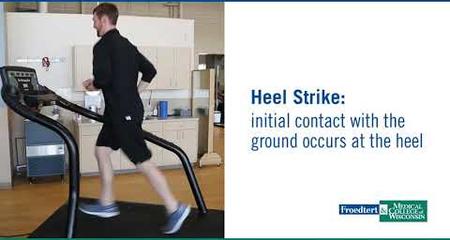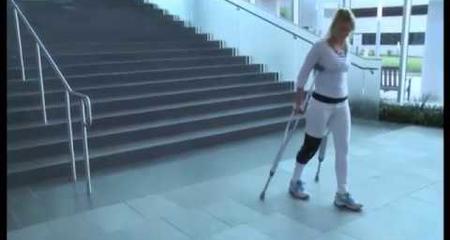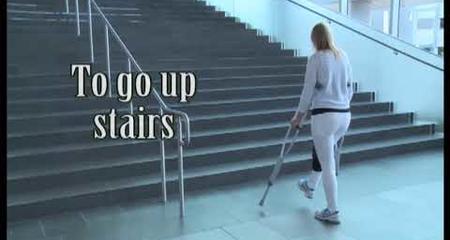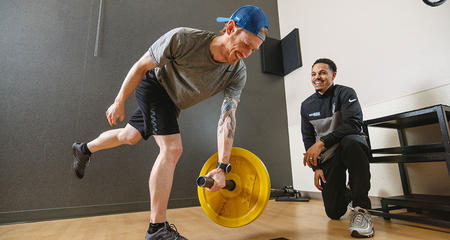The Women’s Sports Medicine Program at Froedtert & the Medical College of Wisconsin provides specialized care for female athletes and the unique physical, psychological and medical issues they face. A subcomponent of the Sports Medicine Center, it is one of only a few comprehensive female-focused sports programs in the entire country and the only one in the Midwest.
Our team of experienced health care specialists work in a multidisciplinary environment to diagnose, treat and prevent sports-related injury and medical conditions. Additionally, our specialized approach encourages optimal performance and promotes a physically active lifestyle for female athletes of any age at any competitive level.
This holistic approach requires a unique team of health care professionals experienced in a wide range of specialties.
The Female Athlete Triad
The Female Athlete Triad consists of three interrelated medical conditions:
- Eating disorders, which lead to
- Amenorrhea (loss of menstrual periods), which leads to
- Osteoporosis
We have conducted several studies on the female athlete triad and its short- and long-term consequences, including increased stress fractures. We have a multidisciplinary team of physicians, dietitians, and psychologists to treat the triad, and more than 15 years of experience studying this hidden condition. We treat athletes from all over Wisconsin and northern Illinois for the female athlete triad and other conditions unique to female athletes.
Physical Therapy
Physical therapists skilled in the treatment of sports injury and up-to-date on unique issues in women, provide expert evaluation and develop exercise programs to get athletes back in shape and back in their game.
Injury Prevention & Performance Enhancement
Women athletes are at a greater risk of experiencing a variety of muscular-skeletal issues, including ACL tears, patellofemoral pain (kneecap pain), shoulder problems and foot deformities. As a preventative measure, we offer exercise and evaluation programs designed to match individual needs. Because female athletes are four to six times more likely to suffer knee injuries, we provide proactive care to reduce the risk of major knee injury.
Female ACL Injury Prevention
Females — especially adolescents and young women — face a higher risk of ACL injury than males. Several physiological differences between males and females have been identified as contributory factors.
- Decreased Ligament Strength During Menstrual Cycle: During the menstrual cycle, estrogen and progesterone levels increase in the body, and this increase is thought to cause decreased ligament strength.
- Notch Size: The space (notch) that the ACL and PCL (posterior cruciate ligament) sit in is thought to be smaller in women. As a result, there is a greater potential for the ACL to be severed.
- Increased Q-angle: Women have a greater Q-angle — the angle from the hip to the ankle. A greater Q-angle is caused by hip varus (wider hips), knee valgus (knock kneed) and foot pronation (flat feet). Having a greater Q-angle puts more stress on the ACL.
- Landing Mechanics and Neuromuscular Control: Women tend to land flat footed, and don’t bend their knees enough when landing. Women also tend to let their knees collapse inwards when landing from a jump. These mechanics put more stress on the ACL and more pressure on the knee joint. These poor landing mechanics are usually due to a lack of neuromuscular control.
- Hamstring Strength & Reaction: Women tend to have stronger quadriceps muscle than hamstring muscle. This puts more shear force on the tibia and can put a greater strain on the ACL. When landing from a jump, the quadriceps and hamstrings need to fire equally to keep the knee in its most stable position. Since women tend to use their quadriceps more, the hamstrings don’t fire equally. This places more shear force on the tibia which, in turn, puts more stress on the ACL.
Nutrition Assessments
Dietitians provide a thorough evaluation of eating habits and provide guidance to help athletes make healthy food choices that furnish optimal fuel for exercise. Advice is tailored to each athlete’s needs and addresses a variety of topics including body composition, weight reduction, muscle and weight gain, hydration, and nutrition planning for endurance training and events, recovery meals and disordered eating.
Osteoporosis Prevention & Treatment in the Female Athlete
Bone health is an area of concern specific to women and particularly to the female athlete. Our comprehensive prevention and treatment approach screens for at-risk athletes and utilizes state-of-the-art DEXA scanning for early diagnosis of osteoporosis/osteopenia.
Sports Psychology
Skilled counselors provide guidance in handling sports-specific issues, such as performance anxiety, stress, time management and disordered eating.
 The Pregnant Athlete
The Pregnant Athlete
Pregnant athletes experience unique musculoskeletal injuries. We recognize and treat these conditions in a comprehensive manner. We also advise mothers-to-be on how to maintain activity throughout their pregnancies, while our specially designed pre- and post-partum exercise programs benefit both mother and baby. Additionally, we provide guidance on physical and nutritional topics related to pregnancy.
Female Sports Medicine Research
The Women’s Sports Medicine Program plays an important role in sports research. We’re also training the next generation of sports medicine physicians. We offer the only sports medicine fellowship focused on the female athlete. Learn more about the female athlete studies conducted.
More to Explore





